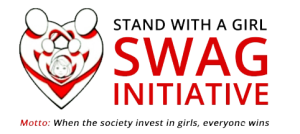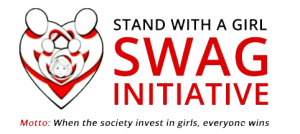We’re standing with girls in camps for internally displaced persons in Nigeria
More than half of the world’s over 50 million internally displaced persons (IDPs) are women and girls. In Nigeria, over 2 million IDPs have been forced from their homes in the last decade by terrorism, communal clashes, and armed banditry.
This has led to the creation of IDP camps in various parts of the country. In addition to the human rights violations faced by all IDPs, displaced women and girls are often at greater risk. Not only because conflict exacerbates pre-crisis patterns of discrimination, but it also exposes women and girls to gender-based violence and prevents them from accessing sexual and reproductive health services.
The Wassa camp in Abuja hosts over 7,000 IDPs. About 70 percent are children and young women of reproductive age. Here, women IDPs lack access to essential health services like contraceptives, antenatal care, safe delivery services, and postpartum care. Sexual activity within the camp leads to sexually transmitted diseases and unwanted pregnancies, for which there is also little recourse. Limited access to safe abortion forces women, especially the young, to use unsafe methods that endanger their lives.
Stand with a girl
To improve the situation, Stand With A Girl Initiative (SWAG), a youth-led community organization under our We Lead program, has been raising awareness since 2021 among the women and girls in Wassa and educating camp leaders, religious and traditional leaders, household heads, and young men about the sexual and reproductive health needs and rights of women and girls.
“Before SWAG Initiative’s presence in the camp, gender-based violence was very prevalent. We used to record cases of women being battered by their husbands for not wearing their hijabs correctly. However, these cases have now been drastically reduced because the men are aware of the organization’s actions towards GBV. Many women like myself have also been trained to speak up and report cases of GBV in the camp, so we continue to advocate to put an end to it.”
Hamsatu Haman, woman leader at camp Wassa

Special sensitization strategy
The initiative has reached over 3,500 women and girls through an innovative strategy in which women IDPs engage in role plays and dramatizations to depict their realities. The process has been used for raising awareness on maternal and infant mortality, providing information on family planning, improving knowledge of menstrual hygiene management, and creating awareness on sexual and gender-based violence. In safe spaces, the initiative trains young girls in assertiveness, negotiation, life skills and other valuable skills for healthy living in the IDP camp. The initiative has also helped over 200 women become camp SRHR ambassadors on childbirth, maternal care, menstrual hygiene management, and family planning.
“When We Lead started, we were all excited when we saw women who needed this support, especially young ones and girls, access SRH information and services. The knowledge they have received will help them continue to access these services without any limitations.”
Ethel Oseghale, SWAG Project Coordinator
This special sensitization was really necessary to help women misinformed by myths and taboos gain factual knowledge about family planning and the use of contraceptives. Before the sensitization, many women in Wassa used herbal mixtures and other crude methods of contraception. The strategy has so far reached over 800 households in the camp and has really changed minds.
“I’m glad that the SWAG Initiative selected and trained me on basic skills such as advocacy skills, communication skills, and other Sexual and Reproductive Health information. This has empowered me to teach the girls in my safe space about their bodies and it has also helped me to know more about my body health”.
Cenje Yohanna, mentor at the SWAG Safe Spaces for girls aged 10 to 11

Women in charge of their SRH; men and boys not forgotten
We Lead puts young women and girls in charge of prioritizing their own sexual and reproductive health and rights. At Wassa IDP camp, this takes the form of training young women and girls as peer educators, especially to debunk myths about contraceptives among their sexually active peers. As a result, the more shy among them can get reliable information about reproductive health from their peers.
“Before now, I didn’t know what the word advocacy meant. But now, I have learned how to effectively communicate with others and I can advocate the government on things that affect me as an internally displaced person in Wassa Camp”.
Amina Abubakar (15 years old)

SWAG also works with men and boys to ensure that they understand the point of the initiative and how positively it affects the overall health of their wives, sisters, mothers, and aunties, as well as the family at large. Sensitive topics such as marital rape and domestic abuse are always discussed.
“We strongly believe that the inclusion of young women and girls under 35 has meaningfully contributed to the overall sustainability of the project. Including young people in the camp at every step of the project’s life cycle has given them an in-depth understanding of the project and greatly enhanced their advocacy skills.
Ethel Oseghale, SWAG Project Coordinator

Post first appeared on Hivos https://hivos.org/
34 thoughts on “We’re standing with girls in camps for internally displaced persons in Nigeria”
Add a Comment Cancel reply
All Categories
Give them a brighter future
+234 813 651 5651
info@standwithagirl.org


Бюджетные услуги электрика в Москве
Электрик с выездом elektrik-master-msk.ru .
How Technologies Are Changing the Construction Process, for sustainable development.
energy-efficient building insulation rapidlybuild.com/a-guide-to-insulation-options-for-energy-efficient-buildings .
услуги стоматологии во Владимире http://www.stomatologiya-vladimir-2.ru .
Top, worth considering.
SUV vs minivan for families http://www.livelycars.com/how-to-choose-the-right-family-car-safety-and-comfort-in-mind .
q5ia0s
Want to launch your own venture?, start with these steps.
how to choose a business structure http://www.timetobuiseness.com/choosing-the-right-business-structure-llc-corporation-or-sole-proprietorship/ .
Budget car rentals, for city trips, with ease and convenience.
cheap long term car rental neochorion.com /paphos-long-term-rental .
Наиболее выгодные условия в Dragon Money
драгон мани отзывы реальные https://gamewild24.com/reviews .
роллетный шкаф на парковку роллетный шкаф на парковку .
Эксклюзивные бонусы в казино Драгон Мани
драгон мани казино официальный войти casinowild24.com .
дешевые кухни по индивидуальным размерам kuhnni-na-zakaz1.ru .
Troubleshooting Issues, and their effective solutions, for successful results.
how to clean HVAC equipment http://www.i-repairing.com/the-ultimate-guide-to-renting-a-house-everything-you-need-to-know/ .
How to Avoid Unpleasant Surprises, for your convenience.
best car rental loyalty programs http://www.rentingforholidays.com/the-ultimate-guide-to-industrial-equipment-repair-and-maintenance/ .
септик для частного цена установки септик для частного цена установки .
Многих интересует, сколько стоит прогон хрумером, ведь цены зависят от объема работы.
Комфорт у ванній кімнаті починається з м’яких килимів та килимків для ванної https://ukrbeautystyle.com.ua/category/KilimiTaKilimkiDlja-vanno-. Вони забезпечують теплу поверхню для ніг та запобігають ковзанню на мокрій підлозі.
Малому бизнесу особенно важно продвижение сайта дешево, чтобы протестировать нишу без крупных вложений. В Санкт-Петербурге таких предложений не так много.
Шары, по суперцене, подойдут для любого мероприятия.
Доставка шаров в Нижнем Новгороде https://shariki-shop47.ru/ .
доступные кредиты с плохой кредитной историей доступные кредиты с плохой кредитной историей .
Windows and doors by Republic, available.
Update your home, with Republic products.
Elegance and functionality, in every door.
Professional installation.
Optimal interior solutions, from Republic Windows and Doors.
Refresh your interior, with innovative solutions.
Energy-efficient solutions, from Republic company.
A range that inspires, from Republic company.
High-quality windows and doors, at reasonable prices.
products.
Windows and doors for your interior, by Republic.
Window and door selection for your home, by Republic.
Special offers on windows and doors, from experienced specialists.
Reliable interior solutions, with Republic.
Innovations in the door industry, for your convenience.
Don’t settle for less, products.
Save your money, from Republic.
Create coziness in your home, with solutions.
Quality products from experts, by Republic.
secondary window glazing https://wearehoist.com/double-glazed-melbourne/ .
7xd94b
срочный кредит с просрочками без отказа http://kredit-bez-otkaza-1.ru/ .
The process of ordering balloons for delivery is now quick and user-friendly. With just a few clicks, you can select your preferred designs and schedule a delivery time. Thanks to the convenience of online ordering, balloon deliveries are accessible to everyone, adding joy to any occasion.
helium balloons dubai http://www.bestwedding-video.com/product-category/helium-balloons .
занять денег без отказа занять денег без отказа .
взять онлайн займ без отказа взять онлайн займ без отказа .
кредиты онлайн без отказа срочно kredit-bez-otkaza-1.ru .
Психоаналитик и психоаналитический психотерапевт Психоаналитик и психоаналитический психотерапевт
482
Реставрация бампера автомобиля — это востребованная услуга, которая позволяет восстановить первоначальный вид транспортного средства после небольших повреждений. Новейшие технологии позволяют убрать потертости, трещины и вмятины без полной замены детали. При выборе между ремонтом или заменой бампера https://telegra.ph/Remont-ili-zamena-bampera-05-22 важно учитывать степень повреждений и экономическую рентабельность. Профессиональное восстановление включает шпатлевку, грунтовку и покраску.
Установка нового бампера требуется при критических повреждениях, когда восстановление бамперов нецелесообразен или невозможен. Стоимость восстановления варьируется от состава изделия, характера повреждений и типа автомобиля. Синтетические элементы поддаются ремонту лучше стальных, а современные композитные материалы требуют специального оборудования. Грамотный ремонт увеличивает срок службы детали и сохраняет заводскую геометрию кузова.
Обязательно отреагирую на ваше обращение за поддержкой по вопросам Ремонт бампера honda civic 4d – стучите в Telegram zqv72
Additionally, these blends are known to elevate mood and foster a sense of calm. Particular terpenes, including linalool and limonene, have been shown to significantly improve mood and promote relaxation.
cannabis aromas for perfume making http://www.chinese-shipments.com/ .
Selecting a trustworthy moving company is crucial. Researching reviews and asking for recommendations can lead you to the best options.
iron grip movers https://www.trafficarbitration.com .
где можно купить недорого угловую кухню где можно купить недорого угловую кухню .
психологическая клиника психологическая клиника .
центр психиатрической помощи нижний новгород центр психиатрической помощи нижний новгород .
Приглашаем вас в путешествие по Уралу! Здесь вы найдете все, что нужно знать о подготовке к пешему походу.
Между прочим, если вас интересует Арктическое сафари на Таймыре: советы и снаряжение, посмотрите сюда.
Вот, делюсь ссылкой:
https://rustrail.ru/arkticheskoe-safari-na-tajmyre/
Счастливого пути и незабываемых впечатлений в походе по Уралу!